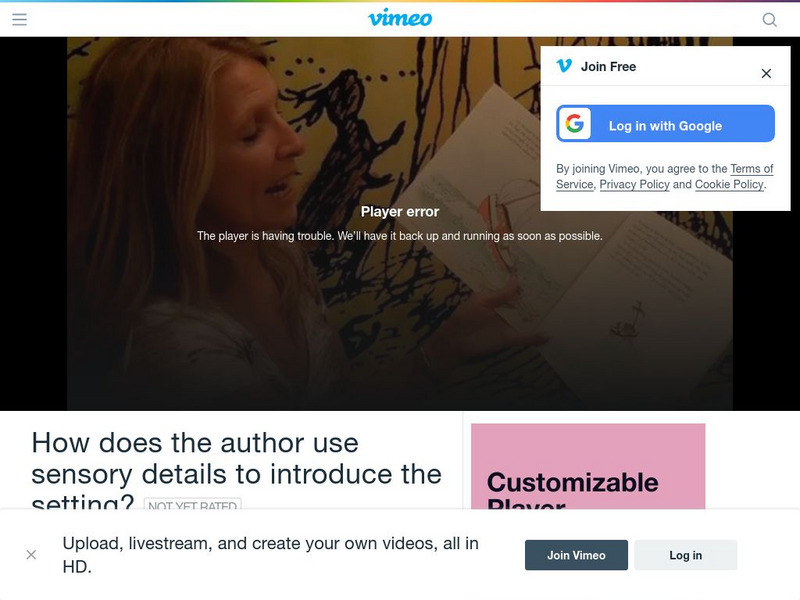Andrews McMeel Publishing
POW! A Peanuts Collection
Make a study of Charles M. Scultz's famous comic strip Peanuts in your language arts class. Class members read and discuss the baseball-themed book POW! A Peanuts Collection. After talking about themes and vocabulary, they complete...
Imagine Learning Classroom
Learn Zillion: Brainstorm Narrative Writing Topics
In this lesson, you will learn how to focus ideas on a topic by making a list. [5:46]
Imagine Learning Classroom
Learn Zillion: Brainstorm Topics for an Argumentative Essay
In this lesson, you will brainstorm opinion topics by listing things that you care about, and that give you strong feelings. [4:06]
Creek View Elementary School
Vimeo: How Does the Author Use Sensory Details to Introduce the Setting?
Watch an educator read a picture book, and practice identifying the sensory details as clues about the setting. [1:38]
Other
'Question Words?' Song (Who, Why, What, When ,Where, How) English on Tour
This cartoon band sings a song that helps students remember the 6 question words: who, what, why, when, where, and how. Students will want to sing along.
BBC
Bbc: Skillswise: What Are Word Types?
This Skillswise site focuses on word types,or as we call them, parts of speech. Included are a video about why learning to identify parts of speech is important, fact sheets and worksheets for instruction, and quizzes on the information...
Imagine Learning Classroom
Learn Zillion: Write a Final Draft of a Narrative Story
In this lesson, you will learn how to write a final draft of a narrative reading response by incorporating all revisions in the correct order. [5:44]
Imagine Learning Classroom
Learn Zillion: Revise to Include Dialogue and Inner Thinking
In this lesson, you will learn how to develop events in a narrative by including dialogue and character's thoughts. [6:17]
Imagine Learning Classroom
Learn Zillion: Understand Different Ways Dialogue Can Be Written
In this lesson, you will learn that good readers read fluently by remembering how dialogue can be written in different ways. [4:06]
Imagine Learning Classroom
Learn Zillion: Write Body Paragraphs That Include Facts and Details
In this lesson, you will learn how to draft body paragraphs in a report by writing a topic sentence and giving supporting details. Login gives access to a slideshow as well. [8:54]
Imagine Learning Classroom
Learn Zillion: Analyze a Writing Prompt
In this lesson, you will learn how to determine what to write about by analyzing a writing prompt. Login gives access to a slideshow as well. [6:37]
Imagine Learning Classroom
Learn Zillion: Presenting a Persuasive Speech to an Audience
In this lesson, you will learn how to present your persuasive speech by keeping your pace, volume and pauses in check. [5:24]
Imagine Learning Classroom
Learn Zillion: Choose a Writing Topic From a List of Brainstormed Ideas
In this lesson, you will learn how to choose a story idea by asking, "Which of these could I write most about?" and then imagining the story. [5:37]
Curated Video
You Tube: Narrator Definition, Examples, and Practice
This video and worksheet define narrator and explain how the narrator compares to the author and characters in a story. The video defines each term, then gives excerpts from well-known stories for learners to read and evaluate based on a...
ABCkidTV
You Tube: How to Write for Your Audience Writing Video for Kids
This video [4:04] will help you learn how to write for your audience in narrative, informational, and persuasive writing. You'll learn about writing style, formal and informal word choice, and tone.
Imagine Learning Classroom
Learn Zillion: Inform a Specific Audience About an Idea by Writing a Persuasive Letter
In this lesson, you will learn how to tell someone specific about your idea by writing a persuasive letter. [4:18]
Imagine Learning Classroom
Learn Zillion: Connect Ideas and Examples in Argumentative Writing
In this lesson, you will learn how to make your paragraphs flow by connecting your examples to your opinion. [3:50]
















